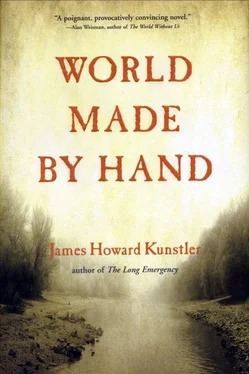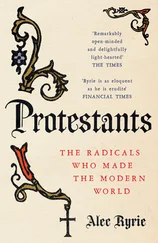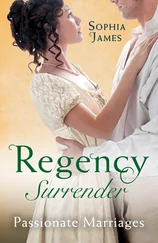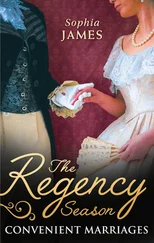“I’m okay,” she said, and she turned her gaze back down to her handiwork.
“How’s your little girl getting on?”
“She’s over to the Allisons,” Britney said with a sigh. The Allisons had an eight-year-old girl and a boy, six. Tom Allison operated the only livery in Union Grove in a time when most of us did not yet own our own horses or rigs. The family had a nice household untouched by personal tragedy, apart from Tom’s never again working as the vice president for administration of the Washington County Community College, which had closed its doors, and his wife Linda’s losing her graphic design business.
“The world seems to be burning up out there,” I said.
“It might as well,” Britney said.
I glanced down at my sandals, made by our cobbler, Charles Pettie, out of old automobile tire treads and leather straps.
“How are you doing for food?” I said.
“All right.”
“I brought you some meal.”
“Thank you.”
“Anything else you short of?”
“People have been very kind,” she said and put on a wan smile, as if speaking from inside a globe of loneliness. I knew what that place was like. Maybe I was projecting my feelings too much, but it was troubling to think what would happen now, with no one to care for her. Less than a week after her husband’s funeral, it seemed indecent to imagine who she might eventually pair up with, but that was the direction my mind went in and I couldn’t help it. There were few single men in our town. The absurd Heath Rucker. George Murdlow, the candlemaker, who never washed. Perry Talisker, who lived in a shack by the river and made bad corn whiskey and decorated the outside walls of his shack with the stinking pelts of beaver, otter, and raccoon. Buddy Haseltine, who was “slow” and helped out at Einhorn’s store in exchange for a cot in the storeroom. Wayne Karp’s tribe. Myself. We were the single men in town. What a sorry bunch we were, I thought. Yet I was shocked to imagine for a moment having a young woman such as Britney in my care, and then to take that a step further into the dark territory of conjugal relations. It was a fugitive thought but I was ashamed of myself. Her father, who did not survive the Mexican flu, had been younger than me when he passed on.
“Are you getting any meat?” I said.
“We could stand some.”
“Ben Deaver mentioned he would slaughter a kid for me. You like goat?”
“I’ll eat it,” she said.
“I’ll bring some by when I get it? You like smoked trout?”
Watching her sit in a beam of evening light, I couldn’t fail to notice how well formed she was. A troubled look came over her. She stood up and brushed bits of broom straw off her apron.
“They came around here,” she said.
“Excuse me? Who came around?”
“That New Faith preacher and some of their women.”
“A lot of damn nerve, after how he behaved at the funeral.”
“What I thought too.”
“What did they want?
“Trying to get me and Sarah to move over to the school.”
“They’re a weird bunch. Why would you consider that?” I said.
She shook her head. Then her features crumbled. She tripped forward into my arms, weeping. Her hair was full of the spice of fresh grass and childbearing. It made me a little dizzy in the heat. I held her until she was cried out. “You don’t have to put in with them,” I said. “You have this fine place here.”
“Maybe,” she said and drew away, pulling herself together. “But this making brooms and baskets won’t do all on our own. People have all they need of those things.”
“We’re your people and we won’t let you go hungry,” I said.
“This being alone is something else,” she said and squeezed her eyes shut as if to keep more tears from coming out. But they did, of course.
I made the trip out to Bullock’s with Brother Jobe the following morning. They’d sent a young man over the night before to notify me to be ready. It was more like being issued instructions through a subaltern than being invited along on a social call, but I didn’t hassle the messenger about it. I went over to the old high school at nine o’clock in the morning, as instructed. The New Faithers were turning the old school bus garage into a barn with thirty stalls and had fenced off the adjacent baseball field into four paddocks. They had twenty-odd horses, several mules, and a big tan jackass, not counting that team of handsome blacks hitched to the Foley cart, and they seemed all set up for breeding operations now. A muscular chestnut stallion grazed in a separate paddock on the hillside beside the old school cafeteria.
“I see you like horses?” Brother Jobe said.
“I do.”
“There’s a lot to like there,” he said and bid me to climb aboard the rig. We took off at a trot.
It felt grand to sit high up behind that team and exhilarating to move so swiftly down the street, like the dream I had about the magic chair. He drove confidently. There was nothing I had yet seen that he was not confident about. The few people out on Main Street stopped to watch as we flew by. The temperature was rising, though, and he slowed the horses to a walk as soon as we got outside of town where there was no more need to show off, and the pavements got bad again. We passed the ruins of the Toyota dealership with its defunct lighting standards lording over a phantom inventory of sumac bushes where the Land Cruisers and Priuses used to sit parked in enticing ranks.
“I have work for you, old son,” he said.
“You’re not of any age to be my daddy,” I said.
“Figure of speech,” he said. “Relax.”
“You’re a cheeky son of a gun.”
“’Course I am. I’m a leader of men,” he said and cackled and gave me a little poke in the ribs. “Word is you are a fine woodworker.”
“Is that so?”
“You any good, then?”
“I’m plenty busy so I must be good enough.”
“Like I was saying.”
“You have plenty of hands among your followers,” I said. “Surely some of them are carpenters.”
“They’re coming along. I’d like for them to work with you, though. Learn a thing or two. There’s a particular special job over our way that needs doing.”
“What would that be?”
“You come by, I’ll show you.”
“Are you trying to recruit me?”
“Wouldn’t dream of it.”
“Just so we understand each other.”
“Oh, I think we do. No strings attached.”
“I hear you’ve been coming around the young widow’s house.”
“We’ve dropped by, like everybody else, trying to help out.”
“You’re leaning on her to come over your way?”
“What’s wrong with that? You all bring her pies and meal and joints of meat. We offer that and more. We offer warm hearts and busy hands and shelter from the storm-and let me tell you, old son, in case you ain’t noticed, we got plenty of bad weather out there.”
We rolled on for a while without speaking, and I couldn’t resist the sheer enjoyment of the journey. The landscape had changed so much over the years. A lot of what had been forsaken, leftover terrain in the old days, was coming back into cultivation, mostly corn, some barley, oats, hay, and lots of fruit trees. Everywhere that had been a parking lot, the pavement was breaking up and growing over with scrub, sumac, and poplar mostly. The roadside corn mercial buildings going out of town to the west were in various stages of slow disassembly: the discount beverage warehouse, the strip mall where the movie rental, dollar store, and a Chinese takeout joint used to be. All the metal was stripped off. One particular building fascinated me whenever I came out this way: a bungalow that obviously once had been a regular house before it was engulfed by commercial sprawl, probably in the 1970s. The bungalow had finally evolved into a gift shop selling all kinds of poorly made and perfectly useless handicrafts to motor tourists bored by the interminable hours behind the wheel and desperate for any excuse to stop for a while. The word Gifts was still there in fading four-foothigh letters on the asphalt shingle roof.
Читать дальше












